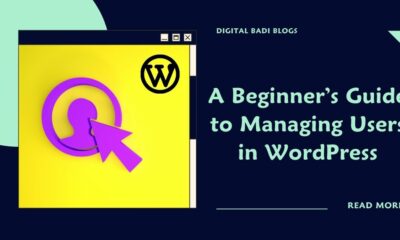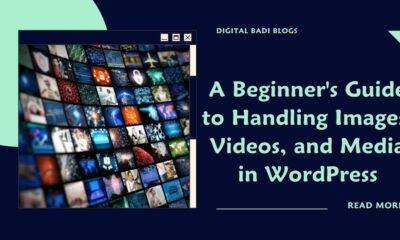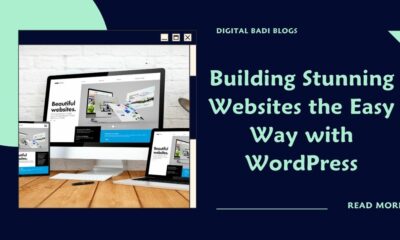SEO
How to get Leads and Sales by SEO?
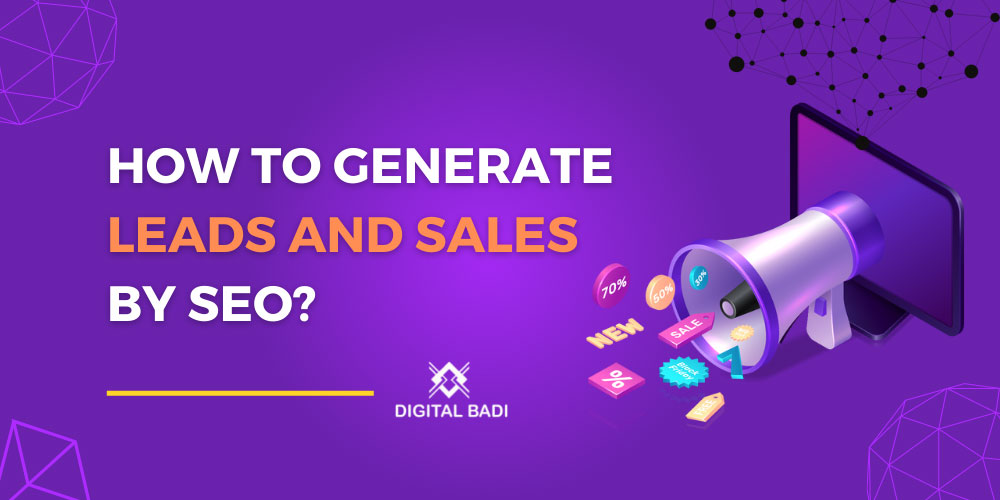
How to get Leads and Sales by SEO
1. Why is SEO Important for Any Entrepreneur?
Search engine optimization (SEO) includes updating websites to raise their rank on search engine results pages. The possibility that Google and other search engines will display users your pages for related search queries increases with your web pages’ ranking.
All of the activities you undertake to increase the internet visibility of your website and its content are together referred to as SEO. This involves everything from link building and social media marketing to finding the right keywords related to your business.
2. How to Get leads and sales through SEO?
Lead generation and SEO are two different tactics. The objective of SEO is to improve and change a variety of aspects of your website in order to improve its positioning on search engines and boost online traffic. On the other hand, lead generation focuses on expanding the number of clients and prospects for your company. The relationship between them is based on how SEO affects lead creation.
How to get leads and sales by SEO:Reputation management and brand building. A positive brand reputation cultivated through SEO efforts yields numerous benefits. These include customer loyalty, increased customer confidence, and transforming customers into brand ambassadors. These factors lead to heightened sales and revenue growth.
Marketing techniques ought to be beneficial. The relationship between SEO and sales is crucial since, in a perfect world, it would constantly attract new visitors to your website. Your website is a great sales tool that works on your behalf while you’re absent or your physical business is closed.
Your objective should be to engage those website visitors and turn them into either one-time or repeat consumers. You are losing out on potential revenue if you are attracting traffic to your website but those people are not converting.
3. These are the few tips to get sales through SEO
Keyword
Everything you do in SEO should be guided by your keyword strategy. since it will help you produce great content that users will want to read. Finding effective keywords that let you target relevant website traffic and aren’t used by millions of people is important.
High-Quality Content
You will be using those keywords to create website content once you have determined the most crucial ones. Create keyword-based, high-quality content for a variety of online publications, including blog posts, website text, videos, and tutorials. Make your content valuable and credible.
On- Page Seo
Maintain your on-page SEO to make it easier for search engines to find your content. Learn how to properly use your keywords and arrange your page’s content so that it is simple to read, easy for search engines to read, and easy to organize for users. Every page on your website and every new piece of content you add will be optimized. Product descriptions for online sales should be original and prepared with both your target audience and search engines in mind. Use simple wording and keywords.
User Experience:
Website users only have so much patience for pages that take a while to load and are challenging to use. By reducing the time it takes for pages to load, organizing your menus and navigation, and eliminating broken links, you can enhance their experience and the likelihood that they’ll stay and continue shopping. Their connection with your website is so improved.
Product Reviews
Customers must have confidence in your ability to deliver a high-quality product or a service based on what they read on your website. To encourage customers to buy from you, try adding product reviews that show what customers think of your goods.
Tips to get leads by SEO:
Boost the speed of your website:
Web page speed has an impact on search engine results. The best user experience is Google’s main objective, and your website’s speed plays a huge role in helping them in achieving the aim.Google will rank your website higher if it reacts to queries more quickly.
Conduct a keyword search
Successful SEO highly depends on keyword research. It includes locating keywords that people enter into search engines when looking for data, goods, or services. When used properly, a keyword begins building links. Link building is the process of acquiring inbound links to your website from other websites.Users can travel across online pages more easily due to links. They also assist search engines in moving between different pages. Additionally, they facilitate the monitoring of both your website’s individual pages and the pages of other websites on the internet by search engines.
Start Building links:
Link building is a critical element of your entire SEO lead-generating plan, but if you want to see success from your efforts, you must conduct yourself properly. Your web marketing activities should be built on the foundation of research, which should also influence all of your decisions.
If your business is local, use local Seo techniques.
You can promote your business to the entire internet community by having a website. In comparison, local SEO is primarily concerned with assisting you in improving your position in the area in which your firm operates. When implementing local SEO techniques to make sure that your target audience can find you on Google, local businesses stand to gain significantly.
Maintain active social media accounts
You are not the only person who is confused about how social media helps SEO. A lot of businesses are unaware of how social media affects SEO. Although Google’s claims to the reverse, data from Search Engine Journal reveals that social media can improve the rating of your website.
John is a Digital Marketing Trainer and Blogger and YouTube creator with 5+ years work experience in digital marketing field. He is the founder of Digital Badi.
Digital Marketing
What is Search Engine Optimization (SEO) and Why Does it Matter?
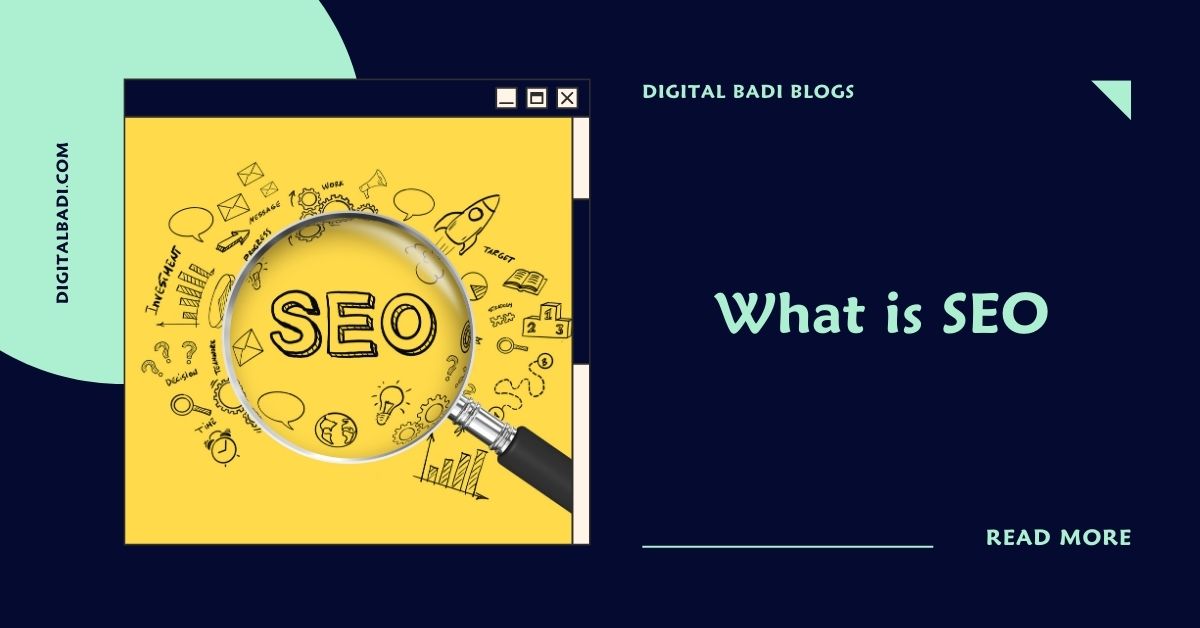
Table of Contents
What is Search Engine Optimization(SEO)
Hey friends! John here, Digital Marketing guru and founder of Digital Badi. Today I want to talk about an important topic that can make or break your online business – search engine optimization, or SEO for short.
What is Search engine optimization: the process of making your site better for search engines. Also the job title of a person who does this for a living: We just hired a new SEO to improve our presence on the web.
You’ve probably heard the term SEO thrown around before, but what exactly does it mean? And why should you care about it if you have a website or blog? Well, stick with me over the next few minutes and I’ll explain everything in simple terms!
A Quick SEO Definition
SEO is the process of optimizing your website and content so it ranks higher and appears more frequently in search engine results. The higher up your website appears for keywords and phrases related to your business, the more likely you are to be found by potential customers and drive traffic to your site.
So in simple terms, SEO helps get your website found easier on Google, Bing, or whatever search engine people use to find your products or services.
Why SEO Matters to Your Business
Now you might be wondering why SEO is such a big deal. Can’t people just find my website if they type in the URL or click on an ad?
Well, the reality is most people don’t search that way anymore. In fact, studies show that close to 90% of online experiences begin with a search engine like Google.
When someone wants to find a business, service, or product online, they start by searching related keywords on Google. If your website doesn’t come up on that critical first page of results, you may be missing out on tons of potential customers.
Think about the last time you searched for something online. Did you click beyond the first page or two of results? Most people don’t. So SEO helps make sure your business is visible and accessible to people who are actively looking for what you offer.
It’s all about visibility and discoverability. SEO allows search engines to better understand your website and rank it accordingly so the right people can find you.
How Search Engines Evaluate and Rank Websites
Now that you know why SEO is critical, let’s talk about how it actually works. How do search engines decide which websites should rank first, second, third and so on for a given search?
While search engine algorithms are complicated (and top secret!), we do know some basic factors that influence rankings:
- Page content – Pages with relevant, useful, well-written content tend to rank higher. Search engines want to point users to authoritative sources that directly answer their query.
- Keywords – Using relevant keywords related to your business naturally throughout your pages helps search engines understand your content focus.
- Backlinks – Quality sites linking back to your pages with anchor text helps send “votes” that your content is worthwhile.
- Site optimization – Technical aspects like site speed, mobile optimization, proper HTML tags and site architecture help search bots crawl and index your site.
- User engagement – Metrics like bounce rate, time on site and others indicate whether real humans find your pages helpful. Greater engagement improves rankings.
There are over 200 total ranking factors, but no need to get overwhelmed! Focus on creating high quality content, user experience, and basic technical SEO and you’ll be off to a great start.
Core SEO Strategies to Boost Your Rankings
Now let’s get into some actionable tips and strategies to optimize your site for higher rankings and visibility. While SEO can get complicated fast, I’m going to focus on three key areas that typically give the best return on time and effort:
1. Target Important Keywords
The first step is researching and selecting relevant target keywords and phrases for your business to optimize around. These should be terms and questions your ideal customers are searching that relate directly to your products, services and content focus.
Some best practices here:
- Brainstorm a list of keyword ideas and search volume using Google’s keyword planner. Look for high traffic searches with medium/low competition.
- Prioritize keywords that relate to purchasing intent like “buy X”, “X reviews”, “[city] X service”.
- Include long tail variations like “how to use X”, “X benefits”, etc.
- Use keyword research tools like SEMrush, Ahrefs or Moz for advanced analysis.
- Track keywords driving existing traffic and conversions in Google Analytics.
Focus your SEO efforts on 5-20 primary keywords, while also optimizing for dozens of secondary long tails. Adding keyword targeting improves discoverability.
2. Create Awesome Content
The next step is creating remarkable website content optimized for your target keywords. Compelling content builds trust, improves conversions and also ranks well in search.
Some tips for keyword-focused content creation:
- Write long form, in-depth articles targeting primary keywords – aim for 2000+ words of helpful info.
- Include related keywords naturally throughout content, but don’t over-optimize. Strive for 1-3% keyword density.
- Create tons of useful content – blog posts, guides, videos, tools – optimized around secondary long tail keyphrases.
- Focus on readability – use headings, lists, images and white space for scannability.
- Answer common questions, objections and searches your audience has around keywords.
- Embed keywords in key places like titles, URLs, image names and opening paragraphs.
Awesome content that really speaks to your audience and directly addresses their interests around your keywords is a huge SEO win.
3. Build Authoritative Backlinks
The final piece of the puzzle is acquiring credible external sites linking back to your content with contextually relevant anchor text. This helps search engines validate your expertise and shows you offer valuable info worth linking to.
Some backlink building tips:
- Create resources like blogs, guides, tools and datasets that other sites would naturally link to.
- Reach out to industry websites and blogs to see if they’ll link to your content if it’s useful to their audience.
- Promote your best content on social media sites like LinkedIn, Facebook Groups and Twitter to drive engagement.
- Guest post on reputable sites in your industry – offer value to their audience while including a relevant backlink.
- Focus on getting editorial links – natural mentions from other sites. Avoid low quality networks.
- Link internally between important pages and content on your own site.
Backlinks remain one of the strongest ranking factors. So build them steadily over time to improve authority and rankings.
Tracking SEO Performance with Key Metrics
Once you implement your core SEO strategy, you’ll want to track how your efforts impact performance. Use these key metrics to measure your progress:
- Rank Tracking – Monitor rankings in Google for your target keywords. Are you moving up in rankings over time?
- Organic Traffic – Analyze Google Analytics to see if organic search traffic is increasing. More keywords ranking higher = more SEO traffic.
- Conversions – Watch goals like email subscribers, downloads and purchases from organic search. More SEO traffic should drive more conversions.
- Click Through Rate – Click through rate (CTR) measures how enticing your snippets are in search results. Higher CTRs tend to improve rankings.
- Page Authority – Page authority metrics like Moz’s DA score or Ahref’s URL Rating show if your overall authority is growing.
SEO is an ongoing process. Continuously optimize pages and monitor analytics to see the impact over time.
The Never-Ending Journey of SEO Success
Phew, that was quite an info dump on all things SEO! The important thing to remember is that SEO is a marathon, not a sprint. It takes consistent work over an extended time to see big results.
But the long term payoff is worth it. By showing up prominently when people search for your products, services and keywords, you can:
- Reach way more of your target customers
- Drive higher quality visitors ready to take action
- Continuously grow awareness and visibility
- Deliver a better return on investment than paid ads
So be patient, stick with it, and keep optimizing! Focus on creating remarkable content, improving technical site factors, and building authoritative backlinks over time.
SEO has the potential to transform your online business and be a key driver behind your success. Hopefully this post provided a helpful overview of what SEO is, how it works, key optimization strategies, and metrics to track.
If you have any other questions feel free to reach out! I’m always happy to chat more about the wonderful world of SEO.
Now get out there and start improving your site’s rankings and visibility today! The opportunities are endless with great SEO.
If You are Looking for Best Digital Marketing Training Institute in Hyderabad.
Digital offers Best Digital Marketing Course in Telugu and English Languages.
John is a Digital Marketing Trainer and Blogger and YouTube creator with 5+ years work experience in digital marketing field. He is the founder of Digital Badi.
Digital Marketing
Search Engine History

Table of Contents
we discuss the history of search engine optimization and A Timeline of Search Engine History, Outbound Link Building Strategies
- How did it begin, SEO?
- Who is the father of SEO
- A Timeline of Search Engine History
1. How does it begin, SEO?
It is believed that SEO was born in 1991. Around this time, the world’s first website was launched, and one quickly turned into many as websites crowded the internet. So, there was a considerable need for structure and accessibility, and the world’s first search engines were created.
2. Who is the father of SEO?
The clear choice was Internet marketing veteran Bruce Clay. Fondly known to the search marketing industry as a founding father of SEO, Bruce received the Lifetime Achievement Award of Excellence in Vision, Execution, and Market Influence in the Practice of Search Marketing.
3. A Timeline of Search Engine History
Search engine optimization (SEO) enhances the visibility of web pages in search engine results pages through organic (unpaid)
The first search engine was developed in 1990 by Alan Emt age and Mike Send all. It was called Archie, an information retrieval system that ran on a UNIX-based computer. The software program could be accessed through telnet and gave users a list of the most popular websites on the internet.
A Timeline of Search Engine History In 1994, two Stanford University students, Larry Page and Sergey Brin created a better search engine called Back Rub which they later renamed Google. The founders wanted to make an easy way for people to find information on the internet without knowing how to spell or type complicated words into a computer’s URL address bar.
- 1997: Yahoo! was founded by Jerry Yang and David Filo.
- 1998: Google was founded by Larry Page and Sergey Brin.
- 2000: Google surpassed Yahoo! in terms of total page views.
- 2003: Google surpassed Yahoo! in terms of unique visitors.
- 2004: The first mobile phone with internet capabilities was released, the Motorola ROKR E1, which came preloaded with Google Maps, an email client, and a web browser.
- 2005: ‘nofollow’ was introduced with the help of which Google, Microsoft, and Yahoo cleaned up their spammy blogs. In the same year, the Snap search engine was launched by Overture owners.
- 2006: Yahoo! acquired DoubleClick for $3 billion (USD) and created the company’s first-ever advertising platform called AdWords that allowed advertisers to target
- 2007: Google was the first search engine to index the entire web in just a few seconds. This is attributed to its ability to crawl the whole Internet in just a few minutes and then index it to provide users with relevant search results. Not only Google has achieved this feat but also Yahoo! and Bing, who came close behind them.
- 2008: Google launched the first search engine index.
- 2009: Bing launched the second search engine index.
- 2010: Yahoo! launched the third search engine index.
- 2011: Microsoft launched its search engine in Bing.
- 2012: Facebook launched a social network called “Facebook,” It started to dominate social media and online advertising globally.
- 2013: Twitter became a social media giant with 1 billion users worldwide and 250 million tweets sent per day. Google’s YouTube also dominated the online video industry with over 2 billion views per day and over 200 hours of videos uploaded every minute worldwide by users using YouTube’s mobile app alone.
Amazon’s Alexa-powered Echo devices were a huge success, as they have allowed millions of customers to interact with their devices in all kinds of settings. - 2014: Amazon began selling its Echo smart speakers and became the first large corporation on the market. It was joined by Google and Microsoft and sold its intelligent speakers about a year later.
4. Outbound Link Building Strategies
Outbound link building is an essential part of SEO, and it is a strategy that should be carried out with the right mindset and in the right direction.
Link-building strategies are what you need to understand when trying to build outbound links. The most common ones include:
5. Link Building
This is the essential link-building strategy, and it’s the strategy you will be using for almost everything. You want to make sure that you are building outbound links in a way that will create value for your website. You’re going to need to do everything you can to build outbound links.
Learn more about SEO by joining in our Searh Engine Optimization
John is a Digital Marketing Trainer and Blogger and YouTube creator with 5+ years work experience in digital marketing field. He is the founder of Digital Badi.
-

 Digital Marketing2 years ago
Digital Marketing2 years agoTraditional Marketing vs Digital Marketing
-

 Telugu Blogs2 years ago
Telugu Blogs2 years agoడిజిటల్ మార్కెటర్ కి ఉండాల్సిన స్కిల్స్ ఏంటి?
-

 Telugu Blogs2 years ago
Telugu Blogs2 years agoడిజిటల్ మార్కెటింగ్ నేర్చుకోవడం ఎలా ?
-

 Graphic Designing2 years ago
Graphic Designing2 years agoCareer Opportunities in Graphic Designing
-

 Digital Marketing2 years ago
Digital Marketing2 years agoStory of Rakesh Bandari (Rakesh Ranks)
-

 Telugu Blogs2 years ago
Telugu Blogs2 years agoప్రీలాన్సింగ్ ద్వారా ఆన్లైన్లో డబ్బులు సంపాదించడం ఎలా?
-

 Digital Marketing2 years ago
Digital Marketing2 years agoSearch Engine History
-

 Video Editing2 years ago
Video Editing2 years agoCareer Opportunities in Video Editing



